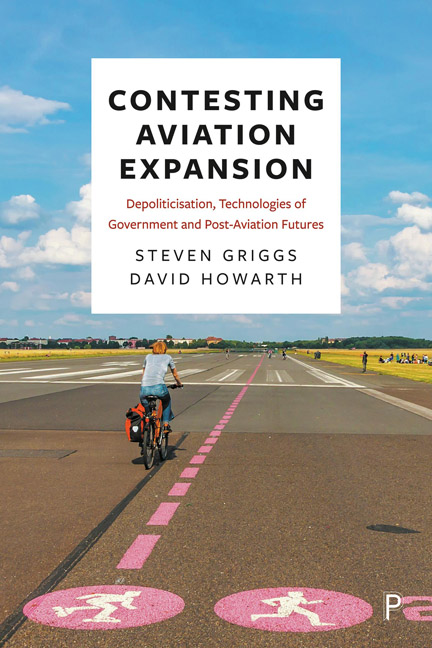 Contesting Aviation Expansion
Contesting Aviation Expansion Book contents
- Frontmatter
- Contents
- List of figures and tables
- List of abbreviations
- Acknowledgements
- Introduction: Problematising the dilemmas of UK airport expansion – puzzles and research strategies
- 1 Depoliticisation, discourse and policy hegemony
- 2 Governing by numbers: fantasies of forecasting, ‘predict and provide’ and the technologies of government
- 3 The anatomy of an expert Commission: Howard Davies, rhetorical reframing and the performance of leadership
- 4 Repoliticising aviation policy: law, planning and persistent activism
- 5 Extreme turbulence: problematisations, multiple crises and new demands
- 6 ‘What if…?’ A manifesto for the green transformation of aviation
- Conclusion: Staying grounded
- Notes
- References
- Index
Introduction: Problematising the dilemmas of UK airport expansion – puzzles and research strategies
Published online by Cambridge University Press: 18 January 2024
- Frontmatter
- Contents
- List of figures and tables
- List of abbreviations
- Acknowledgements
- Introduction: Problematising the dilemmas of UK airport expansion – puzzles and research strategies
- 1 Depoliticisation, discourse and policy hegemony
- 2 Governing by numbers: fantasies of forecasting, ‘predict and provide’ and the technologies of government
- 3 The anatomy of an expert Commission: Howard Davies, rhetorical reframing and the performance of leadership
- 4 Repoliticising aviation policy: law, planning and persistent activism
- 5 Extreme turbulence: problematisations, multiple crises and new demands
- 6 ‘What if…?’ A manifesto for the green transformation of aviation
- Conclusion: Staying grounded
- Notes
- References
- Index
Summary
Perhaps nothing better illustrates our current obsession with air travel than the rise of scenic ‘joy flights’ for passengers ‘missing the excitement of travel’ during the COVID-19 pandemic (Choat, 2020). Tickets for one such 7-hour round trip from Sydney on Qantas sold out within 10 minutes, making it one of the airline's fastest selling flights ever. Seat prices on the 10 October flight ranged from £607 economy to £2,750 for business class. Employing 787 Dreamliner aircraft normally used for long-haul international flights, Qantas's Great Southern Land flight promised to fly as low as 1,220 metres over New South Wales, the Northern Territory and Queensland, giving passengers the chance to see Australia's most famous landmarks, including Sydney harbour, Uluru and the Great Barrier Reef. A Qantas advert for the trip promised it would ‘reignite the joy of flying’, adding that ‘from the sky, there are no border restrictions’. In its defence, Qantas pleaded that it was not alone in offering its customers ‘flights to nowhere’ as airlines strived to generate business in the midst of global restrictions on air travel. Yet, it is still extraordinary that just months after forest fires devastated Australia, and after scientific studies concluded that global warming ‘boosts’ the hot dry weather likely to cause bush fires by at least 30 per cent, people were still clamouring to take unnecessary pleasure flights (Ghosh, 2020). Ironically, Qantas publicly promoted its commitment to tackling climate change through a ‘simple philosophy: measure, reduce, offset and influence’.
That such flights were over-subscribed epitomises how far the consumption of flying has for many become an integral part of their everyday enjoyment and routines. This was not lost on Qantas, whose chief executive was quick to justify the flights as a response to customer demand, pointing out that ‘so many of our frequent fliers are used to being on a plane every other week and have been telling us they miss the experience of flying as much as the destinations themselves’ (McGregor, 2020). More generally, it is shocking that in some quarters the plane has become an ‘acceptable’ substitute for the coach or train, even for short domestic trips.
- Type
- Chapter
- Information
- Contesting Aviation ExpansionDepoliticisation, Technologies of Government and Post-Aviation Futures, pp. 1 - 20Publisher: Bristol University PressPrint publication year: 2023
